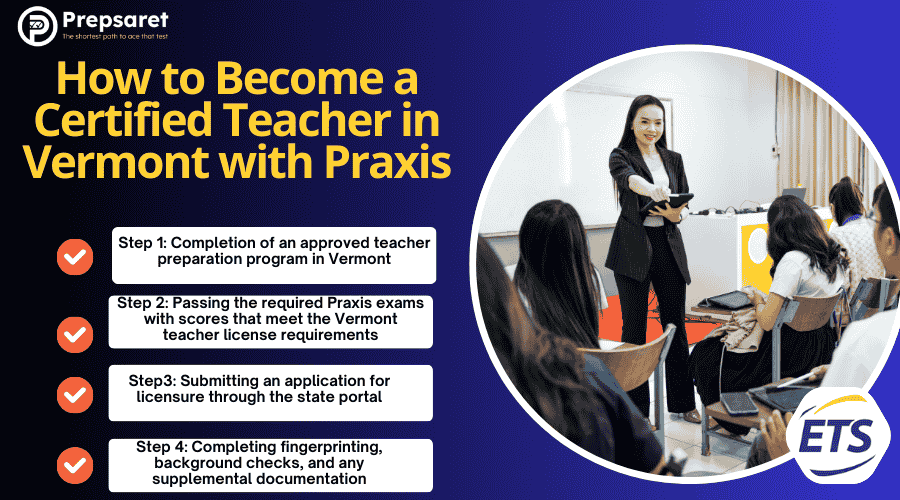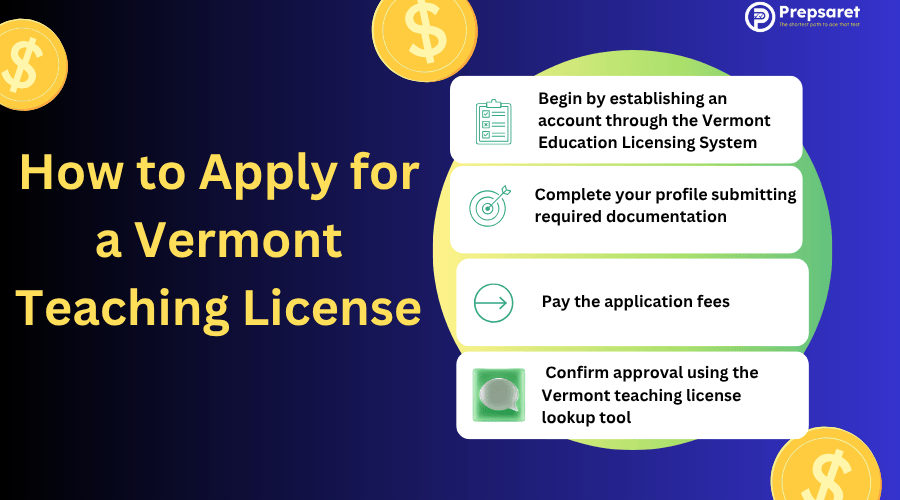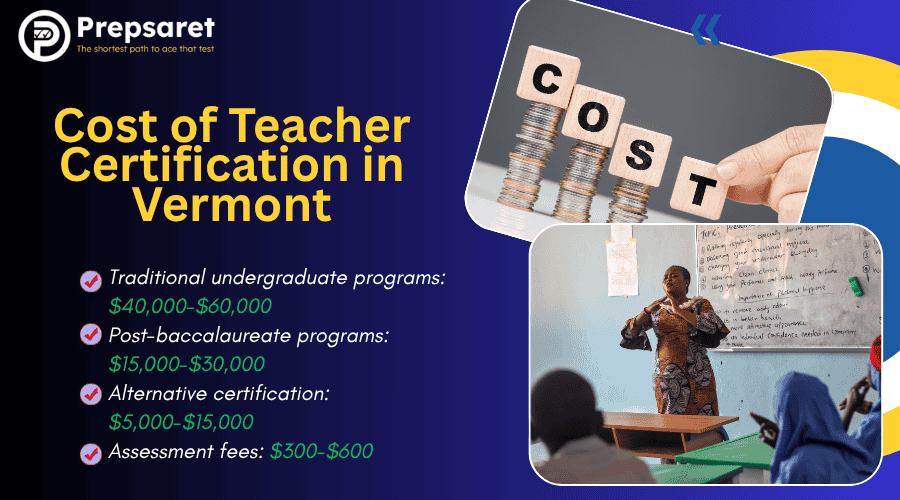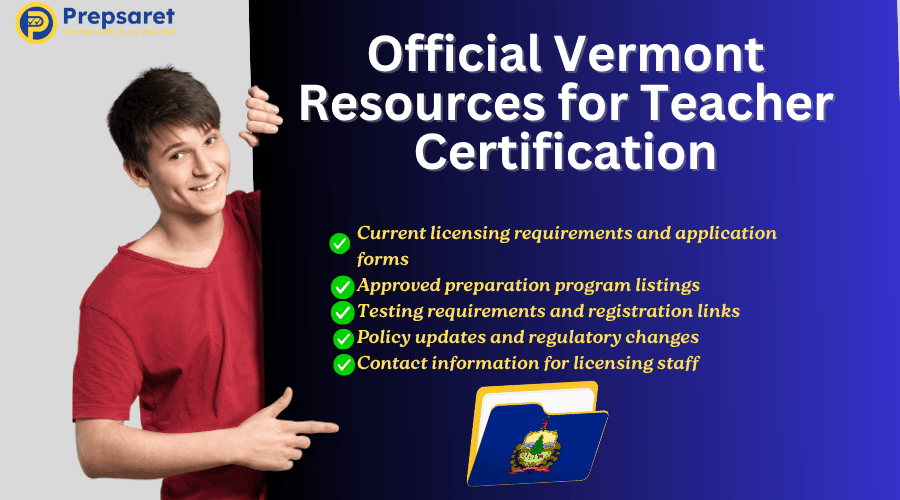Are you passionate about shaping young minds and considering a rewarding career in education? Understanding how to become a teacher in Vermont involves navigating specific licensure pathways, meeting state requirements, and completing approved preparation programs.
Vermont’s education system values qualified, dedicated educators who can inspire students across its rural communities and vibrant towns. This comprehensive guide walks you through every step of the certification process, from initial preparation to landing your first teaching position.
At Prepsaret, we provide the exact practice questions and answers you need to pass your Vermont teaching exams with confidence.
Why Teach in the Green Mountain State?
Vermont offers unique opportunities for educators seeking meaningful careers in community-focused schools. With about 300 public schools serving 76,000 students, the state maintains lower student-to-teacher ratios than the national average, allowing for more personalized instruction and stronger relationships with students and families.
The state’s commitment to educational excellence creates demand for qualified teachers, especially in STEM, special education, and world languages. Vermont teaching jobs often include competitive benefits, strong pension plans, and professional development support.
Teachers value Vermont’s natural beauty, close-knit communities, and progressive, student-centered educational policies. Before beginning your teaching career, it’s important to understand the specific teaching requirements in Vermont set by the Vermont Agency of Education.
These rigorous standards ensure every classroom is led by knowledgeable, skilled professionals prepared to meet diverse student needs.
Vermont’s Teacher Certification Structure
The Vermont Department of Education teacher certification office oversees all educator licensing across the state. Unlike other states that issue “certificates,” Vermont grants a Vermont educator license to qualified professionals teaching in public schools.
Vermont educator license credentials come in several levels:
- Level I License: Initial license for new teachers valid for up to seven years
- Level II License: Professional license requiring additional experience and education
- Master Teacher License: Advanced credential recognizing exemplary educators
Each level has distinct qualifications. The steps to become a teacher in Vermont start with earning a Level I License by completing an approved preparation program and showing subject-area competency.
Endorsements range from early childhood through secondary subjects like English, math, science, and social studies. Choosing your endorsement early helps align coursework and assessments with your teaching goals.
Essential Vermont Teaching License Requirements
Meeting Vermont teaching license requirements involves specific academic, testing, and background standards that ensure every educator is classroom-ready. The state mandates these steps before issuing a Vermont educator license or approving Vermont teacher certification applications.
Academic Requirements for Vermont Teacher Certification
To qualify for Vermont teacher certification, you must:
- Hold a bachelor’s degree from a regionally accredited institution
- Complete an approved teacher preparation program (or meet alternative pathway requirements)
- Maintain a minimum GPA of 2.75 (requirements may vary by program)
- Complete student teaching or supervised clinical experience
Your degree doesn’t need to be in education, but you must show subject-matter expertise in your endorsement area through coursework or exams.
How to Become a Certified Teacher in Vermont with Praxis
Vermont teaching exams (Praxis, MTLE, etc.) verify your academic and subject knowledge. The state typically requires:
- Praxis Core Academic Skills for Educators: Measures basic reading, writing, and math proficiency
- Praxis Subject Assessments: Content-specific exams, such as Elementary Education, Mathematics, or English Language Arts
Some endorsement areas may require additional tests. Check the Vermont Agency of Education’s website for current exam policies. Many candidates use Prepsaret for practice tests featuring real exam questions and explanations.
Background Clearance in Vermont
Vermont public school teaching requirements include mandatory background checks to ensure student safety:
- FBI fingerprint-based criminal history review
- Child abuse registry verification
- Disclosure of any past convictions or disciplinary actions
Clearances typically remain valid for five years and must be updated during renewal.
Vermont Teacher Preparation Programs
Vermont teacher preparation programs provide the knowledge, hands-on experience, and professional skills required for effective teaching. The state approves multiple institutions offering specialized teacher education pathways in Vermont to meet diverse learning goals.
Traditional College-Based Teacher Education Programs in Vermont
Vermont’s universities offer comprehensive preparation options for future educators:
- University of Vermont (UVM): The state’s largest program, offering undergraduate and graduate degrees in various endorsement areas.
- Castleton University: Emphasizes strong field experience and classroom immersion throughout the program.
- Norwich University: Provides flexible licensure programs ideal for working professionals.
These teacher education pathways in Vermont typically take four years for undergraduate degrees or 1–2 years for post-baccalaureate study. Coursework includes child development, instructional methods, assessment, and classroom management.
Online and Hybrid Teacher Preparation Options in Vermont
For those needing flexibility, online teacher preparation programs in Vermont deliver high-quality instruction with convenient scheduling. Approved programs often feature:
- Self-paced, asynchronous coursework
- Virtual mentoring and academic advising
- Local placement coordination for student teaching
- Short in-person residency sessions
Even online candidates complete supervised field experiences in Vermont schools to gain practical, state-specific teaching experience.
Vermont Teacher Apprenticeship Program
The Vermont teacher apprenticeship program offers an innovative earn-while-you-learn route to licensure. Participants can:
- Work as paid assistants or paraeducators while completing coursework
- Earn academic credit for workplace learning
- Receive guidance from experienced mentors
- Graduate with minimal student loan debt
This pathway usually spans 2–3 years and leads to both a bachelor’s degree and a Vermont educator license, making it ideal for career changers and school-based employees seeking advancement.
Alternative Pathways and Out-of-State Reciprocity in Vermont
Not every educator follows a traditional route, and Vermont supports several flexible options for entering the profession.
Alternative Teacher Certification Options in Vermont
Alternative teacher certification Vermont programs serve professionals transitioning from other careers who hold bachelor’s degrees but didn’t complete traditional teacher preparation. These accelerated pathways include:
- Transcript Review Process: Candidates with strong subject-area coursework may earn licensure by demonstrating competency and passing required exams.
- Emergency or Provisional Licenses: Schools facing staffing shortages may hire candidates on provisional status while they complete remaining requirements.
All alternative routes require passing Vermont teaching exams (Praxis, MTLE, etc.) and demonstrating pedagogical competence. Many candidates rely on Prepsaret for practice materials designed to improve exam performance and confidence.
Vermont Teacher Reciprocity for Out-of-State Educators
Teacher reciprocity Vermont policies help already-licensed educators transition into the state’s system. While Vermont has no formal reciprocity agreements, it provides a streamlined review for:
- Currently or recently licensed teachers from other states
- Educators with National Board Certification
- Teachers licensed in NASDTEC member states
The Vermont teaching license reciprocity for out-of-state educators process typically requires:
- Official transcripts and proof of degree
- Verification of valid out-of-state licensure
- Teaching experience documentation
- Passing scores on any required Vermont assessments
How to Apply for a Vermont Teaching License
Once you’ve completed preparation requirements, how to apply for a Vermont teaching license involves several administrative steps through the Vermont Agency of Education’s online system.
Creating Your Account
Begin by establishing an account through the Vermont Education Licensing System. This portal allows you to:
- Submit application materials electronically
- Track your application status in real-time
- Communicate with licensing staff
- Manage renewals and endorsement additions
Use the Vermont teaching license login portal to access your account and monitor progress throughout the application process.
Required Documentation for License Application
Your application packet must include:
- Official transcripts from all post-secondary institutions
- Verification of program completion from your preparation provider
- Passing test scores sent directly from testing agencies
- Background clearance results
- Application fees (typically $50-$150 depending on license type)
Ensure all documents arrive before submitting your application, as incomplete packets delay processing.
Monitoring and Tracking Your Vermont License Application
After submission, you can confirm approval using the Vermont teaching license lookup tool. This public resource displays:
- License validity dates
- Endorsement areas
- License level
- Any disciplinary actions or restrictions
Processing typically takes four to six weeks outside peak periods, so applying early helps avoid employment delays.
License Renewal and Professional Growth in Vermont
Maintaining your Vermont educator license requires ongoing professional development and periodic renewal.
Renewal Requirements for Level 1 and Level 11
Vermont teaching license renewal depends on your license level:
- Level I License: Valid for up to seven years
- Level II (Professional) License: Must be renewed every five years
To renew, applicants must show:
- Completion of required professional development hours
- Maintained good standing with no unresolved disciplinary issues
- Updated background clearances
- Payment of renewal fees
Professional Development Hours and Credit Requirements
Continuing education for Vermont teachers emphasizes relevant, high-quality learning experiences that enhance instructional practice. Requirements include:
- Earning professional development credits through workshops, courses, or conferences
- Participating in school-based professional learning communities
- Pursuing advanced degrees or endorsements
- Engaging in action research or curriculum development projects
Many Vermont school districts offer tuition assistance and paid professional development days, supporting teachers as they meet renewal and growth requirements.
Related post: How to Become a Teacher in Montana
Investment and Timeline for Vermont Teacher Certification
Understanding the financial and time commitments involved in earning your teaching license helps you plan effectively for this rewarding career.
Cost of Teacher Certification in Vermont
The cost of teacher certification in Vermont varies significantly by pathway you choose
- Traditional undergraduate programs: $40,000-$60,000 for in-state tuition at public universities
- Post-baccalaureate programs: $15,000-$30,000 depending on credit requirements
- Alternative certification: $5,000-$15,000 for required coursework and supervision
- Assessment fees: $300-$600 for required Praxis exams
These figures exclude living expenses, books, and other materials. However, many candidates offset costs through:
- Federal financial aid and student loans
- Teaching scholarships and loan forgiveness programs
- Graduate assistantships offering tuition waivers
- Employer tuition assistance for paraeducators pursuing licensure
Investing in quality exam preparation through platforms like Prepsaret helps you pass assessments on the first attempt, avoiding costly retake fees.
How Long Does it Take to Become a Teacher in Vermont?
The timeline for becoming a teacher in Vermont depends on your background:
- Traditional route: Four years (bachelor’s degree + licensure)
- Post-baccalaureate program: 12–24 months for candidates with a degree
- Alternative certification: 6–18 months, often while teaching on a provisional license
- Out-of-state reciprocity: 2–6 months for license review and approval
These timeframes assume full-time study. Part-time or working students may take longer to complete requirements.
Career Outlook and Teacher Salary in Vermont
Vermont teacher salary levels reflect the state’s commitment to supporting educators:
- Starting salary: $38,000–$45,000 (district and degree dependent)
- Average salary: Around $62,000 annually
- Experienced teachers: $70,000–$85,000+ with advanced degrees and experience
Most districts provide incremental salary increases for each year of service and additional pay for graduate credits. Vermont educators also enjoy:
- Comprehensive health insurance
- Pension and retirement benefits
- Paid leave and professional development stipends
Teacher demand remains strong across Vermont, especially in rural districts and high-need subject areas. Many offer relocation incentives and mentoring support to attract qualified educators.
Do You Need a Master’s Degree to Teach in Vermont?
No. Vermont doesn’t require a master’s degree for initial licensure. You can begin teaching with a bachelor’s degree and Level I license, working successfully throughout the seven-year validity period.
However, master’s degrees become advantageous for several reasons:
- License advancement: Moving from Level I to Level II professional license requires either a master’s degree or equivalent professional development (typically 60+ post-baccalaureate credits).
- Salary increases: Many Vermont districts provide higher pay—typically $8,000–$15,000 more per year—for teachers with master’s degrees.
- Career flexibility: Advanced degrees open opportunities for specialized roles like curriculum coordinator, department chair, or instructional coach.
- Endorsement expansion: Master’s programs often allow you to add endorsements in high-need areas, increasing employment opportunities.
Most educators in Vermont pursue master’s degrees within their first few years of teaching, supported by:
- Evening and summer course schedules
- Online program flexibility
- District tuition reimbursement
- Loan forgiveness programs for continuing education
While not immediately necessary, planning for graduate study enhances long-term career prospects and earning potential.
Related post: State by State Praxis requirements
Resources and Support for Vermont Educators
Successfully navigating the steps to become a licensed teacher in Vermont becomes easier with the right resources and community connections.
Official Vermont Resources for Teacher Certification
The Vermont Department of Education teacher certification webpage is the best starting point for official information. It includes:
- Current licensing requirements and application forms
- Approved preparation program listings
- Testing requirements and registration links
- Policy updates and regulatory changes
- Contact information for licensing staff
Bookmark this site and check regularly for updates, as policies may change based on new legislation or state board actions.
Vermont Professional Organizations and Association
Vermont Education Association (VEA) offers support through:
- Professional liability insurance
- Advocacy for educator interests
- Professional development opportunities
- Networking events connecting new and experienced teachers
Joining professional organizations even before completing certification helps you build connections and stay informed about Vermont’s education landscape.
Online Communities and Social Media Groups in Vermont
Online spaces like how to become a teacher in Vermont Reddit forums and social media groups offer firsthand insights from current educators. Members often discuss:
- Job search strategies and interview tips
- District comparisons and school culture
- Practical classroom management advice
- Work-life balance in teaching
While official sources provide requirements, online communities offer real-world context from those already working in Vermont schools.
Exam Preparation Support With Prepsaret
Passing required assessments represents a significant hurdle in licensure, making quality preparation essential. Prepsaret stands out as the premier platform for Vermont teaching exams, offering:
- Practice tests mirroring actual Praxis format and difficulty
- Detailed answer explanations clarifying concepts
- Progress tracking identifying strengths and improvement areas
- Up-to-date content aligned with current test specifications
- Money-back guarantees ensuring your success
Investing time in thorough exam preparation through Prepsaret significantly increases first-attempt pass rates, accelerating your path to licensure.
Related post: Praxis Practice Test: Real Exam Questions for Praxis Core
How to Become a Teacher in Vermont: FAQs
What Is the Quickest Program to Become a Teacher?
Alternative certification or post-baccalaureate programs can lead to licensure in 6–18 months. The Teacher Apprenticeship Program takes about 2–3 years.
How Much Do Vermont Teachers Get Paid?
The average Vermont teacher salary is about $62,000. Beginners earn $38,000–$45,000; experienced teachers with master’s degrees can reach $85,000+.
Is Vermont a Good State for Teachers?
Yes. Vermont offers small class sizes, strong unions, excellent benefits, and supportive communities, though housing costs are higher in some areas.
Does Vermont Have a Teacher Shortage?
Yes, especially in STEM, special education, and rural schools. Many districts offer signing bonuses, relocation help, and mentorship to attract educators.
What Is the Hardest State to Teach in?
It depends. States with low pay, high costs, or overcrowded classes are toughest. Vermont rates well for satisfaction but has cold winters.
Conclusion: Your Path to Teaching in Vermont
Understanding how to become a teacher in Vermont helps you navigate certification with confidence. From choosing preparation programs to earning your Vermont educator license, every step moves you closer to a rewarding teaching career.
Whether through traditional routes, alternative pathways, or reciprocity, Vermont welcomes passionate educators. Begin your journey with solid preparation, trust Prepsaret for exam success and lasting classroom impact.





